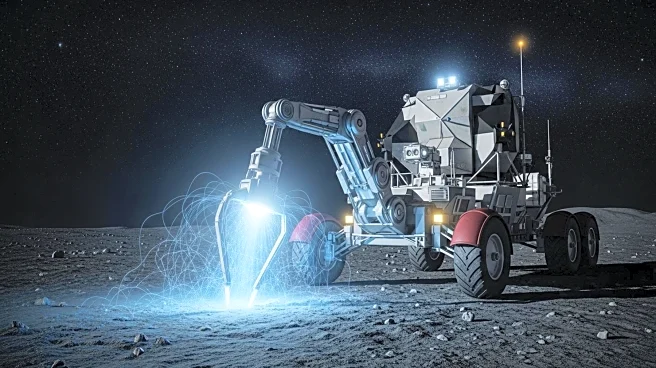What is the story about?
What's Happening?
Interlune, a Seattle-based startup, has announced a significant partnership with Bluefors, a leading manufacturer of dilution refrigerators, to supply helium-3 extracted from the Moon. Helium-3, a rare isotope on Earth, has accumulated on the lunar surface due to billions of years of solar wind bombardment. The demand for helium-3 is rising, particularly in industries such as quantum computing, where it is used to maintain ultra-low temperatures necessary for qubit stability. Interlune plans to sell up to 10,000 liters of helium-3 annually to Bluefors between 2028 and 2037, marking the largest purchase of lunar resources to date. The company, founded by Rob Meyerson, former president of Blue Origin, aims to overcome technological and logistical challenges to begin lunar mining by 2028.
Why It's Important?
The deal between Interlune and Bluefors highlights the growing demand for helium-3 in the quantum computing industry, which is moving towards commercialization. As tech giants like Google, IBM, and Microsoft make progress in scaling quantum technologies, the need for helium-3 is expected to increase. This partnership could accelerate advancements in scientific and medical discoveries enabled by quantum computing. Additionally, the successful extraction of lunar resources could pave the way for a new era of space resource utilization, potentially impacting national security, medical imaging, and fusion energy sectors. However, the feasibility of lunar mining remains uncertain due to technological and financial hurdles.
What's Next?
Interlune plans to launch a demonstration mission in 2027 and establish a pilot plant by 2029, supported by over $18 million in venture funding. The company aims to develop robotic harvesters to extract helium-3 from the Moon. While the roadmap is promising, the success of lunar mining will depend on overcoming significant challenges. The deal with Bluefors signals rising interest from the quantum computing industry, but experts caution that the actual value of lunar helium-3 is still uncertain. The outcome of Interlune's efforts could influence future space resource extraction initiatives.
Beyond the Headlines
The pursuit of lunar helium-3 extraction raises ethical and legal questions about space resource utilization. As companies explore the Moon's potential, international regulations and agreements may need to be established to govern resource extraction and ensure equitable access. The environmental impact of lunar mining also warrants consideration, as it could affect the Moon's surface and broader space ecosystem. Long-term, successful lunar mining could shift economic and geopolitical dynamics, with countries and companies vying for control over extraterrestrial resources.















